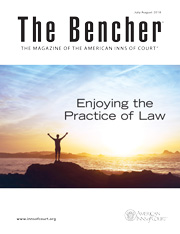The Internet and Whatever Happened to the Right to be Let Alone?
The Bencher—July/August 2018
By Richard K. Herrmann, Esquire

 The Freedom of Speech is a Constitutional Right, which we hold sacred. But the right to privacy does not appear to be all that important to us. Some of us would like it to be. To me, it ought to be right up there with Life, Liberty and the Pursuit of Happiness.
The Freedom of Speech is a Constitutional Right, which we hold sacred. But the right to privacy does not appear to be all that important to us. Some of us would like it to be. To me, it ought to be right up there with Life, Liberty and the Pursuit of Happiness.
We have traded convenience, information and instant access to everything, with an open window into our lives. Commercial businesses can track us, “friends” can follow us and anyone can say almost anything about us on the internet; and there is little we can do to protect ourselves. Of course, certain privacy laws are being developed to protect certain types of information, so we cannot be unlawfully exploited by identity thieves. But that is not the privacy issue I have in mind.
Once you are a target on the internet, there is little you can do about it. The “click and agree” practices we never read, but must consent to before we reach the next screen, shred whatever right we think we have. In the old days of the Uniform Commercial Code, those agreements would be considered unconscionable.
How many times do clients complained that they have been unfairly targeted on the Internet and now they appear on the first page of Google when their name or business is searched? Their choice is limited to burying it by trying to get their name to positively appear enough times that the bad reference is too far down to be meaningful.
The European Union has been dealing with this issue for a number of years. https://www.newyorker.com/magazine/2014/09/29/solace-oblivion
In many respects, the EU’s concern over privacy rises to the level of freedom of speech here in the U.S. The European courts have developed the doctrine of “The Right to be Forgotten.” Under certain circumstances, an individual or organization can require search engines, such as Google, to remove all links to an inappropriate or unfortunate reference. And Google has the technical capabilities of doing just that. According to Google reports, there have been more than 650,000 requests to remove 2.5 million links since 2014 and Google has agreed to 43% of these demands. http://fortune.com/2018/02/28/google-right-to-be-forgotten-europe-reasons-eu/
This appears to be a very controversial concept in Europe due to concerns over censorship and certainly would not trump freedom of speech here in the United States. But now that we know unlinking is technically available, it would be refreshing to consider the thought of some Internet Court, here in the U.S., resolving disputes relating to rights to individual privacy. It doesn’t have to be government controlled—might even be designed and operated by Google. It is unfortunate that the entire concept of “The Right to be Forgotten” actually presumes that someone’s privacy has already been invaded. And that is what needs to be fixed.
The thought of being able to pursue one’s life outside of the prying eyes of others is not new. While it may not have risen to a constitutional right, outside of unlawful search and seizure, “The Right to be Let Alone” was shaped long before the Internet. In 1890, Samuel Warren and Louis Brandeis, published an article in the Harvard Law Review “The Right to Privacy.” It is difficult to imagine they did not have Google and the Internet in mind when they put quill to paper. “Recent inventions and business methods call attention to the next step which must be taken for the protection of the person, and for securing to the individual…the right ‘to be let alone’…Numerous mechanical devices threaten to make good the prediction that ‘what is whispered in the closet shall be proclaimed from the house-tops.’” http://www.cs.cornell.edu/~shmat/courses/cs5436/warren-brandeis.pdf.
Of course, it appears the right to privacy may be a generational issue. Certainly, the privacy expected by the baby boomers is far different than those of Generation Z. Many of the latter do not care and there are those in the former group who actually think privacy still exists. Next month, we will debate the “Right to be Let Alone” with the “Freedom to Yelp.”
Richard K. Herrmann, Esquire is a partner in the firm of Morris James in Wilmington, Delaware. He is a Master of the Bench member of the Richard K. Herrmann Technology AIC.